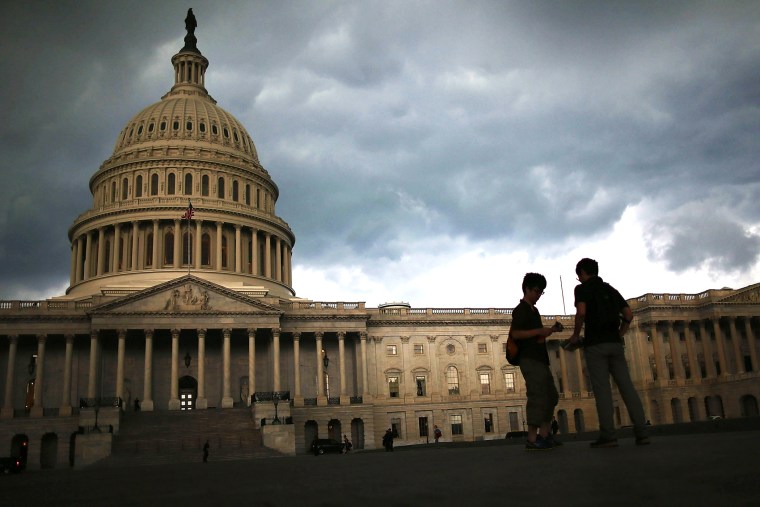It was a historic day on Capitol Hill yesterday as Nancy Pelosi reclaimed her Speaker's gavel and the new House Democratic majority got to work. The first order of business: ending the government shutdown that began two weeks ago.
The Democratic-controlled House on Thursday night passed a pair of spending bills that would fully fund and re-open the federal government, though neither will become law.Hours into the first day of the 116th Congress, the House approved a bill that would fund the rest of the government through Sept. 30 with new funding levels. It separately approved a measure that would extend current funding for the Department of Homeland Security through Feb. 8.
In an unexpected development, the votes did not fall strictly along partisan lines. On the first spending measure, which would fund the Department of Homeland Security -- but which would not give Donald Trump money for a giant border wall -- five House Republicans broke ranks and voted with the Democratic majority.
On the second bill, which would fully fund the other federal agencies affected by the partial shutdown for the rest of the fiscal year, seven GOP lawmakers voted with the Dems.
This is more than just a legislative footnote. To the extent that Republicans have an actual strategy for their shutdown, it's based on a simple idea: Democrats will be so eager to bring this fiasco to an end that they'll give in and pay the president's ransom. Rep. Mark Meadows (R-N.C.), a leader of the right-wing House Freedom Caucus, was quite explicit when describing this perspective on Dec. 20 -- the day before the shutdown began.
So long as Republicans stick together, the argument goes, Dems will have no choice but to approve spending billions of taxpayer dollars on Trump's medieval dream project. In practice, however, it's Democrats who are united, while cracks begin to emerge in the GOP's (ahem) wall.
This wasn't just evident in last night's House votes; the intra-party divisions are starting to emerge among Senate Republicans, too.
The New York Times reported overnight, "[W]ith the shutdown soon to enter its third week, and Mr. Trump dug in on his demand for $5 billion to build a border wall, [Senate Majority Leader Mitch McConnell] for the first time is facing pressure from members of his own party to step in to resolve the stalemate that has left 800,000 federal workers either furloughed or working without pay."
Sen. Cory Gardner (R-Colo.) -- by most measures, the Senate's most vulnerable Republican incumbent next year -- yesterday effectively endorsed the approach backed by House Democrats. Sen. Susan Collins (R-Maine), who's also up for re-election in 2020, is wavering on her party's posture, too. [Update: Soon after this piece was published, Collins endorsed the bipartisan House bill.]
Even Sen. Marco Rubio (R) told a Miami audience the other day, in reference to the shutdown, "Could the White House have handled this better? Absolutely. And I wish they had."
At a certain level, the emerging divisions within the GOP aren't too surprising. Which was more likely to happen: a group of congressional Democrats saying, "You know, maybe we should give Trump billions of taxpayer dollars for a border wall," or a group of congressional Republicans saying, "This shutdown is a mistake that needs to end"?
The larger question, however, is what Trump and his party are prepared to do about cleaning up their own mess. In theory, Senate Republicans shouldn't have a problem with the pair of spending bills House Democrats approved last night, since a similar plan cleared the upper chamber two weeks ago on a voice vote. Pelosi & Co. have basically asked the GOP-led Senate to approve the same policy it passed without controversy on Dec. 19.
But for now, Mitch McConnell has said he won't consider any resolution that Donald Trump doesn't like. With Republicans feeling antsy about their failing strategy, the key words in that sentence are "for now."
